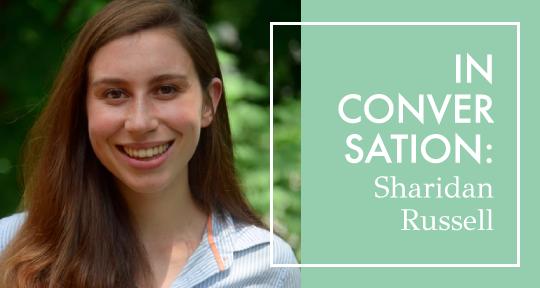Sharidan Russell is a Rabat-based researcher who studies language ideologies. After graduating with a BA in Arabic and Middle East Studies from Dartmouth College, she was named a Fulbright fellow to Morocco, where she conducted research on transition of Darija, the dialect of Arabic spoken in the Maghreb, into a written language. Keenly interested in the ways new writing practices evolve, Russell’s work draws on sociolinguistics and the field of linguistic anthropology as she seeks to understand changing social practices through the lens of literature.
Hodna Nuernberg (HN): Morocco, where you have been conducting your research, has a very rich linguistic landscape. Could you please describe how Morocco’s languages interact and describe the role of Darija specifically?
Sharidan Russell (SR): Morocco has both official languages and what I refer to as “de facto official languages”. After its independence in 1956, Morocco began the process of Arabization by re-introducing Arabic as the language of government and education. By Arabic, Modern Standard Arabic (MSA)—or Fusha—was meant. Today, MSA is the kingdom’s official language, but French, which is not in the constitution, functions as a de facto official language. There are very high standards for “fluency” in France and there are many ideologies around the continued use of French. In 2011, Tamazight—the name of a family of languages spoken by the Amazigh, or indigenous peoples of the Maghreb—became an official language in the constitution. Morocco is also home to a range of dialects, which are—or have been—largely unwritten. Darija is the most widely spoken of these dialects and it varies from region to region. Darija is also a de facto official language, in a sense, because it is so widely used for communication at a variety of levels, though it has no official status. Hassaniya, which is spoken in the south, is another dialect that is so different from Darija as to be mutually unintelligible. Hassaniya is recognized in the constitution—not as an official language, but as an important aspect of Morocco’s culture and diversity. Darija is the only of these that is not mentioned.
My research looks at the concept of language ideology against the backdrop of Morocco’s linguistic context. A language ideology refers to the thoughts and feelings we all carry about the languages we speak (or do not speak). For example, we sometimes see a stereotype in the U.S. about people who speak with a southern accent as being less educated. While stereotypes like this aren’t necessarily true, for research like mine it is important to understand where these ideologies come from and how they reflect other parts of the culture.

